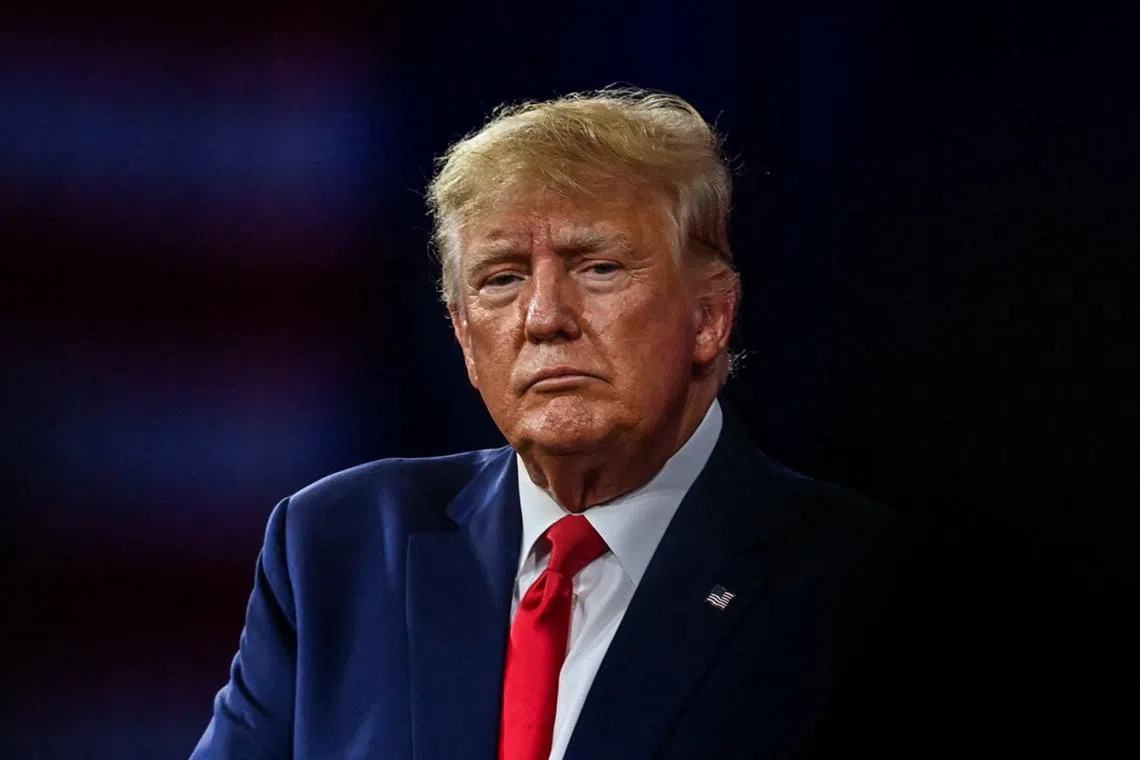Trump's long history of casting the US Justice Department as villain
Sign up now: Get ST's newsletters delivered to your inbox

Former US president Donald Trump began attacking the Justice Department in 2017.
PHOTO: AFP
Follow topic:
WASHINGTON - With former US president Donald Trump facing his third indictment in 2023,
Almost as soon as the news of the indictment broke, his campaign called the latest charges the product of a “weaponised Department of Justice”.
“These un-American witch hunts will fail and president Trump will be re-elected to the White House so he can save our country from the abuse, incompetence and corruption that is running through the veins of our country at levels never seen before,” the Trump campaign said in the statement.
The line of attack by Trump, the Republican front runner for president, was a familiar one. It dates back to at least 2017, when he began alluding to a “deep state” plot by the Justice Department.
Back then, he was fixated on Mrs Hillary Clinton’s use of a private e-mail server to store classified material and questioned why his opponent in the 2016 election had not been criminally charged.
“Why aren’t our deep State authorities looking at this?” Trump wrote in a post on Twitter in November 2017. “Rigged & corrupt?”
The term “deep state” had appeared to be a riff on remarks that his chief strategist Steve Bannon made just after Trump’s inauguration.
Mr Bannon, at a conservative gathering, said that the “deconstruction of the administrative state” was under way.
But as Trump’s own grip on power became threatened – by his first impeachment in 2019 and a two-year investigation into Russian election meddling – he broadened the narrative.
His campaign speeches became peppered with accusations that career civil servants had conspired to undermine his presidency.
His rhetoric became more vitriolic, calling those officials “absolute scum” and comparing them to Nazis.
His campaign invoked “Nazi Germany” again on Tuesday.
Trump was so consumed with conspiracy theories about the “deep state” that his administration weeded out Cabinet members and career civil servants it deemed to be disloyal at prolific rates.
Scores left under their own volition.
By one account, the Trump administration had lost nearly 1,200 senior career service employees in its first 18 months – roughly 40 per cent more than during President Barack Obama’s first 18 months in office.
He relied on the narrative again when he was impeached a second time after the January 6, 2021, attack at the US Capitol.
And now, with criminal indictments against him piling up as he seeks to return to the White House, Trump has further demonised the federal government.
He has characterised each successive indictment as examples of the Justice Department being weaponised against him, pivoting from the broader “deep state” conspiracy to one aimed squarely at Democrats now in power.
His Republican rivals have largely echoed his narrative.
“As President, I will end the weaponisation of government,” Governor Ron DeSantis of Florida, Trump’s top 2024 rival, said on Twitter moments after the third indictment was announced on Tuesday.
And his allies in Congress and conservative media have always been quick to adopt his talking points. At times, they also cast themselves as victims of the “deep state”.
An example: In 2018, Republican Representative Jim Jordan, the House Freedom Caucus firebrand, blamed liberal bureaucrats in the government amid criticism that he had failed to report sexual misconduct at Ohio State University while he was a wrestling coach there.
Mr Jordan is now chair of a House sub-committee on the weaponisation of the federal government, which Republicans created in 2023.
Though none has gone as far as him, Trump is not the first politician who has sought to discredit the Justice Department, which includes the Federal Bureau of Investigation, often as the walls of justice closed in on them.
As his presidency began to unravel in 1974, then US President Richard Nixon warned the Justice Department to back off its investigation into Watergate, when a White House “plumbers” unit broke into the Democratic National Committee’s offices in Washington. He resigned about four months later.
Republicans cried foul when, four days before the 1992 presidential election, a special prosecutor brought an additional one-count indictment against Mr Caspar Weinberger, the former defence secretary, accusing him of lying to Congress about the Iran-Contra Affair. President George H.W. Bush’s GOP allies blamed the timing of the indictment for his defeat by Democratic challenger Bill Clinton.
Mr Bush had been vice-president in the Reagan administration during the scandal.
Democrats and President Bill Clinton’s lawyer relentlessly attacked the impartiality of Mr Ken Starr, the independent counsel who led the investigation into the president’s affair with Ms Monica Lewinsky, during impeachment proceedings in 1998.
They accused him of “overkill” and claimed he was leaking information to the news media.
At the request of the Justice Department, his oversight role had been expanded from beyond his initial inquiry into the Whitewater deal. Mr Clinton was impeached mostly along party lines in the House, but acquitted by the Senate. NYTIMES

